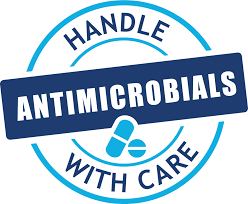
L-R : Pharm. (Mrs) Adeola Alli , Co-Founder/CEO OneHealth Pharmacy; Pharm. Akinjide Adeosun Chairman/CEO, St. Racheal’s Pharmaceuticals; Dr.Tomi Coker, Hon. Commissioner for Health, Ogun-State and Dr. Mutiu Bamidele, Consultant Medical Microbiologist, LASUTH at the media event.
As Nigeria joined the rest of the world to mark the 2020 World Antimicrobial Week (WAW), experts have advocated the need to implement various regulations and policies on rational use of antibiotics as way of reducing the current huge burden of antibiotic resistance in the country.
Speaking at a media dialogue organized by St. Racheal’s Pharma, the House of antibiotics, as part of the activities to mark the WAW, the experts agree that governments and stakeholders must take urgent steps to reduce the current unfettered access to antibiotics by the public to prevent a looming disaster.
In his presentation, the Chairman/CEO St. Racheals Pharma, Mr. Akinjide Adeosun disclosed that no fewer than 700,000 people die globally due to antimicrobial resistance (AMR), adding that the figure could rise to ten million by 2050 unless the world could come up with new and better treatments,
“Researchers are currently developing more than 550 innovative treatments and vaccines for COVID-19 – a pathogen unknown just a year ago. But although AMR has been a known and growing problem for decades, only one new class of antibiotics has been 4 discovered since 1984.
“At the same time, the emergence of antibiotic resistant pathogens has accelerated, giving rise to life-threatening infections that will not respond to available antibiotic treatment. Inevitably, the more that antibiotics are used, the more that bacteria develop resistance—rendering the drugs less effective and leading public health authorities worldwide to flag antibiotic resistance as an urgent and growing public health threat.
“While we wait for new antimicrobials, doctors, governments, and the public can buy time by further curbing the overuse of existing antibiotics in medicine and agriculture, which is partly what caused the problem,” he said.
Also speaking at the event, Dr. Mutiu Bamidele, a Consultant Clinical Microbiologist at the Lagos State University Teaching Hospital (LASUTH) disclosed that use, misuse and overuse of antimicrobials in humans animals and plants have become main drivers in the development of drug-resistant infections in addition to factors such as poor medical prescribing practices and inability of patients to adhere to treatment.
According to him, multiple factors including overuse of medicines in humans and livestock, poor access to clean water, sanitation and hygiene had accelerated the threat of antimicrobial resistance worldwide.
The experts however decried the unrestricted use of antibiotics in the country , saying only a strict adherence to relevant laws and regulations on rational use of antibiotics could reduce the problem to a maximum level.
Dr. Tomi Coker, the Ogun State Commissioner of Health, noted that Nigeria has good policies to control the widespread misuse and abuse of antimicrobials adding that the main problem is that such policies are never implemented.
“Researchers have actually looked at our policies and they have been credited as one of the best policies worldwide but unfortunately, we are not implementing them. We are good at writing them but we are not good at doing them.
“In Nigeria, there are policies and publications that will support the domestication of the global action plan such as ‘NCDC Antimicrobial use and resistance in Nigeria’ published in September 2017. Concurrently, the Federal Ministry of Health, Agriculture and Environment published a situation analysis on antimicrobial use and resistance in Nigeria. All these are out there for us but we don’t use them,” she said.
Dr. Coker urged pharmacists and microbiologists to embark on advocacy to policy makers at both National and sub-National levels to implement relevant policies on rational use of antibiotics in the country.
“Policy makers have the responsibility to make quality health care accessible and affordable to all Nigerians.
“The CSOs need to start engaging and challenging the government about this because if we are not careful this (current problem of antimicrobials in the country) will soon become a crisis and maybe, the worse pandemic,” she said
Similarly, Mr. Adeosun called on the government to address the problem of massive poverty among Nigerians.
“The National Bureau of Statistics (NBS) in a report about poverty and inequality in Nigeria from September 2018 to October 2019, said 40% of people in the continent’s most populous country lived below its poverty line of 137,430 naira ($381.75) a year or N11,452 in a month or N381.75 per day. This represents 82.9 million people. (Poverty and Inequality in Nigeria.
“I believe to tackle the problem of antibiotic resistance, we need to tackle poverty (The Patients) & Funding (The HealthCare Industry). A patient who spends N381.75 per day on Food & non food cannot afford to buy a full dose of an antibiotic worth N1, 000.00.
“I urge our national and subnational governments to institute free medical care for the poor people.1% of the profit of companies should be legislated to fund this scheme at the national level & 1% tax from contractors at the sub national government. For it to be sustainable,
“I call on governments to make provision for free medical care in the annual budget. I also want to use this medium to encourage the banks to improve financing to healthcare organizations. A Bank for HealthCare is suggested to be set by the Federal government to cater for the strategic needs of the health care Industry at Low interest rate of 5%.
“This will help the private sector to improve on the hard and soft infrastructures of the healthcare industry. Only an educated workforce with sound health can be productive thereby leading to the prosperity of Nigeria,” Adeosun further said.

